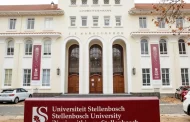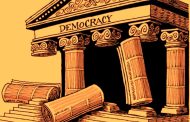It must be in 1996 or 1997 that Newsweek did a cover story on crisis management leadership by looking at each of the incumbents of the G-7 only to conclude that the world was leaderless and was in need of another Karl Marx but, this time a less troublesome one or words like that. It privileged Marx not because it had become a Socialist inspired medium but because the (Western) world was looking for a simplified framework of the world after the post Cold War. Marx’s critique of capitalism as a crisis riddled system is one such framework but not the Socialist alternative and, hence, Newsweek’s notion of a less troublesome Marx this time.

Lenin and the Socialist literary figure, Maxim Gorky
The magazine’s search for a grand narrative must have been informed by what it made of the interviews it had with biographers and scholars of leading statesmen, at least in the history of the Western world and who were suggesting the problem seemed to be the lack of a simplified narrative of which the “End of History” stuff that Fukuyama and co were bandying about was not fitting. Certainly, if the magazine were to do another such story today, it is most likely to declare that the world is in need of another Lenin in terms of the most clear headed and most muscular in the politics of crisis management leadership. That is crisis in terms of the prevailing stalemate in the world today.
Lenin had done it before. Shortly before As rivalry among European colonialists for share of colonial booty and ‘spheres of influence’ in the ‘Third World’ in the so-called age of imperialism was enjoying romantic and moralistic treatises, it was a Lenin who came up with an aggressively argued thesis that what was happening was the epochal shift from free competition to monopoly capitalism. And that the consequence of the rivalry as well as the shift was wars, not the kind of ‘philosophical synthesis’ that forebears of Fukuyama such as Halford Mackinder were suggesting to the British about how to manage the stalemate. That was spectacular because there were other interpretations that were not that critical.
Before this outing, Lenin had also done the first major rupturing within Marxism. He disrupted the sequence Marx put on the table by amending it at two levels. Russia, he said, could not afford to wait for capitalism to be exhausted before it moved to Socialism while it had a catching up with the rest of Europe to accomplish in terms of industrial capacity. Two, ‘peasants’ became his working class. And he went ahead to make a Socialist revolution real n a basically neo-feudal formation such as Russia as in 1917, surely to everyone’s surprise.
The third exceptionalism was his war diplomacy in which everything in the books were undercut as he maneuvered through the thicket of great power intrigues. Depending on how he weighed the situation, he made tactical alignment with whichever player he came up against, including the Nazis just to secure a breathing space and move forward. In the end, it was Russia that dealt the destabilising blow on the axis powers. And to think that these were all happening under the pressures of War Communism is to imagine a highly charged brain.

Vladimir Putin, inheritor of Lenin’s office
Fourth striking thing must be the question of the choice of a successor. Of course, he chose Stalin but he was not ignorant of the potentials and limits of Stalin. That he was aware of such a problem is to be found in him saying that the candidate they had served peppery stuff but that there was no alternative to Stalin. Within 20 years or so from 1924 when he died, Russia was exactly where he had imagined it: an industrial economy. It is safe to assume that he could see something very much unlike himself in Stalin in terms of managing the transition but there was no choice outside him if the objective that inspired the revolution was to be achieved. In other words, while not defending repression and human suffering, those who talk about such subjects must be mindful of the context.
The last point is how China would most likely not be where it is today but for Lenin. The Chinese Communist Party has certainly benefited from its close study of the tensions of moving a nation from industrial backwardness to modernity which the Russians accomplished by shortshrifting the classical Marxist sequentialism, for example. The Chinese were to close their eyes to dogma in the late 1970s, for instance, by saying the color of the cat didn’t matter provided it caught mice.
But the question still remains: What can we then say is Lenin’s contributions to the world after making all these claims for him?
There can be no one answer but the attribute to which all his achievements can fit is agency or the capacity for meaning making, for reflexivity. Lenin was a mind – world monist, not a follower of Rene Descartes. Looking at issues from the contradictions or tensions that practice unfolded was his strength. And this is the only way to explain how he could foresee that inter-imperialist rivalry was going to bring about war because although the logic of the competition was material, the interpretation was the mental force at work: nationalism. That enabled him to settle for ‘communism in one country’, tactically. Agency can make one man so crucial to a moment.
This line of argument means that the world is in need of the Lenin that can respond from the political field of play to the question that some academics, Alex Callinicos in particular, are asking as to whether capitalism needs the state system, especially when that question is reframed to absorb a post COVID-19 world. It is not the sort of question that a dialectician can answer.




























